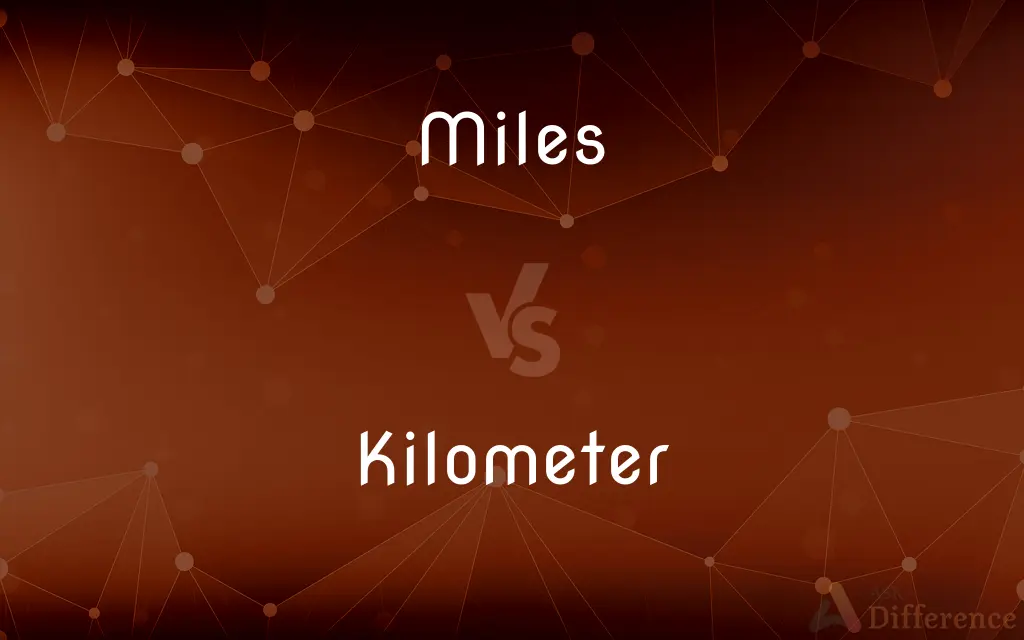Miles vs. Kilometer — What's the Difference?
By Tayyaba Rehman — Updated on September 23, 2023
Miles are units in the imperial system; Kilometers are metric units. Both measure distance.

Difference Between Miles and Kilometer
Table of Contents
ADVERTISEMENT
Key Differences
Miles and Kilometers are both units of distance, yet they hail from different measuring systems. While Miles are part of the older imperial system, still prevalent in countries like the United States, Kilometers are metric, commonly used internationally.
Miles, often symbolized as "mi", have been in use for centuries, with roots in ancient Roman measurements. Kilometers, on the other hand, represented as "km", emerged during the metric system's development in France in the late 18th century. Each Kilometer is precisely 1,000 meters, showcasing the metric system's decimal-based structure.
Miles might be fewer in number when measuring the same distance as Kilometers due to the difference in their lengths. One Mile is approximately 1.60934 Kilometers, making it longer than a Kilometer. If one were to travel 60 Miles, that would be nearly equivalent to traveling about 96.56 Kilometers.
Both Miles and Kilometers are integral to transportation, geography, and daily life. While Americans might express highway speeds in "miles per hour," most of the world uses "kilometers per hour." Awareness of both Miles and Kilometers and their conversion is beneficial in our globalized era.
Comparison Chart
System
Imperial
Metric
ADVERTISEMENT
Origin
Ancient Roman measurements
Developed in France, 18th century
Symbol
Mi
Km
Length relative to each
1 Mile = 1.60934 Kilometers
1 Kilometer = 0.621371 Miles
Common Usage
Predominantly in the U.S.
Internationally accepted
Compare with Definitions
Miles
A unit of distance in the imperial system.
The park is just 5 Miles away from here.
Kilometer
Roughly equivalent to 0.621371 Miles.
The reservoir is about a Kilometer wide.
Miles
Roughly equivalent to 1.60934 Kilometers.
He ran a marathon, which is 26.2 Miles long.
Kilometer
Denoted by the symbol "km".
The sign indicates 50 Kilometers to the next town.
Miles
Used predominantly in the U.S. for distance measurement.
The sign says it's 10 Miles to the next gas station.
Kilometer
Used globally as a standard unit of distance.
The trail spans a distance of 12 Kilometers.
Miles
Commonly referred to in speed as miles per hour.
The car was traveling at 60 Miles per hour.
Kilometer
A metric unit representing 1,000 meters.
The grocery store is two Kilometers down the road.
Miles
Abbr. mi. or mi A unit of length equal to 5,280 feet or 1,760 yards (1,609 meters), used in the United States and other English-speaking countries. Also called land mile, statute mile. See Table at measurement.
Kilometer
Part of the decimal-based metric system.
The marathon's length is 42.195 Kilometers.
Miles
A nautical mile.
Kilometer
A metric unit of length equal to 1,000 meters (0.62 mile). See Table at measurement.
Miles
An air mile.
Kilometer
Alternative spelling of kilometre
Miles
(Sports) A race that is one mile long.
Kilometer
A measure of length, being a thousand meters. It is equal to 3,280.84 feet, or 0.62137119 of a mile.
Miles
A relatively great distance
Had to walk for miles in the airport.
Kilometer
A metric unit of length equal to 1000 meters (or 0.621371 miles)
Miles
Plural of mile
Miles
(informal) A great distance in space or time.
His final shot missed the bullseye by miles.
From the top of the hill you can see for miles.
No need to hurry. The deadline is miles away.
Miles
Much; a lot used to emphasise a comparative
Her new paintings are miles better than her older ones.
Miles
An older unit with origins in ancient Roman measurements.
The old map measured the journey in Miles.
Common Curiosities
What system is the Mile a part of?
Miles are part of the imperial system.
How do I convert Miles to Kilometers?
Multiply the number of Miles by 1.60934.
How many Kilometers make up a Mile?
One Mile is approximately 1.60934 Kilometers.
What is the symbol for Miles?
The symbol for Miles is "mi".
Is the Kilometer based on a decimal system?
Yes, a Kilometer represents 1,000 meters, showcasing the metric system's decimal nature.
Where is the Kilometer predominantly used?
Kilometers are used internationally as part of the metric system.
Which is longer, a Mile or a Kilometer?
A Mile is longer than a Kilometer.
Which unit is used for speed limits in the U.S.?
Speed limits in the U.S. are typically given in miles per hour.
In which countries is the Mile still a standard unit of distance?
The Mile is predominantly used in the United States.
How is the Kilometer denoted?
The Kilometer is denoted by the symbol "km".
Why is it helpful to know both Miles and Kilometers?
Given the global nature of travel and communication, understanding both Miles and Kilometers aids in comprehending distances internationally.
How many Miles are there in a marathon?
A marathon is 26.2 Miles.
Is the Kilometer's origin more recent than the Mile's?
Yes, the Kilometer was developed during the late 18th century in France, while the Mile has ancient origins.
Do most GPS systems offer readings in both Miles and Kilometers?
Yes, many GPS systems allow users to toggle between Miles and Kilometers.
How do I convert Kilometers to Miles?
Multiply the number of Kilometers by 0.621371.
Share Your Discovery

Previous Comparison
Leather vs. Leatherette
Next Comparison
Studying vs. ReadingAuthor Spotlight
Written by
Tayyaba RehmanTayyaba Rehman is a distinguished writer, currently serving as a primary contributor to askdifference.com. As a researcher in semantics and etymology, Tayyaba's passion for the complexity of languages and their distinctions has found a perfect home on the platform. Tayyaba delves into the intricacies of language, distinguishing between commonly confused words and phrases, thereby providing clarity for readers worldwide.














































